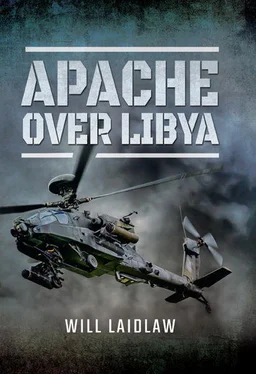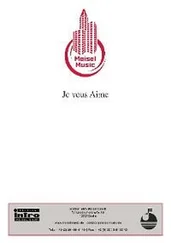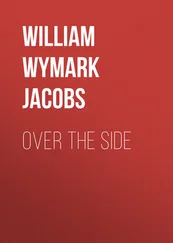Nothing was on the target area, no ZSU 23-4, not a single movement. Nick asked jet man if his Litening pod could see anything. ‘Negative,’ came the reply. Nothing. No movement, no people. This was unnerving and it did not tally with the targeting imagery taken three weeks before. Pro-Gad survivors were lying low, perhaps they’d heard the Apache coming, or got a message from the coast. After five months of NATO aerial strikes those who were still in business suppressing the uprising were the survivors. They had adapted their techniques and were still alive.
Nick transmitted, ‘Nothing here, no point in hanging about, fuel says it’s time to move on. My lead.’
The second target was a checkpoint at the crossroads where the main route to Tripoli and the road directly north to the refinery town of Az-Zawiyah met, a critical confluence vital to Gaddafi’s defence of the coastal oil towns and the capital. This had to be occupied permanently. As briefed just three hours earlier, it was Reuben who would be first on target two, and as soon as the checkpoint came into view he immediately began his attack run. This time the imagery resembled almost perfectly what he saw through the FLIR. In his right eye in glorious green shades of temperature sat the checkpoint in the right place, the technicals with weapons mounted on the rear, the flagpoles and flag. Then the ultimate confirmation: troops with weapons manning the checkpoint and the roads leading in and out.
‘Target is good, multiple technicals and soldiers,’ Reuben relayed to Nick.
‘Visual. On your left, ready.’ Nick confirmed he was looking at the same targets.
Reuben was already on the 30mm cannon and had fired the first 20-round burst, each of the rounds detonating as it struck the checkpoint, vehicles and road junction. Even if a round landed near rather than directly on a target, the fragmentation sprayed out with an effect similar to a high explosive grenade. He pulled the trigger again and again, methodically adjusting the fall of shot and working his way from one target to another.
The effect was immediate. Nick, as the looker, watched the 30mm arcing into the checkpoint in curved flight then exploding on impact. Twenty rapid high explosive detonations in a small space, all within two seconds, destroyed a technical. Then, just five seconds later, more rounds whipped in, another two-second twenty-point explosion wrecking the next vehicle. Pro-Gad vehicles and equipment erupted in fire and the ambushed soldiers sprinted from the scene, abandoning the checkpoint.
Nick finely focused his FLIR and methodically searched the checkpoint. There was no need for him to add to the hell on the ground. The checkpoint was out of action. Two vehicles were burning and their weapon operators were dead. Pro-Gad soldiers were in disarray and no one was attempting to fire into the sky – a sure sign that they knew such an action would be fatal. Nick had no need or wish to pull the trigger just because targets remained. The area was not obliterated, it hadn’t been bombed into the Stone Age; it had simply been rendered non-operational. Better still, twenty to thirty pro-Gad were now out of work and unlikely to return.
Both aircraft watched as men ran out into the desert. These soldiers were about to spread the word – ‘the Apache came to the mountains and we had no chance’. Desertion was a genuine option for these men and it was gathering momentum across the country. The gentle nudge of eighty rounds of 30mm was all the persuasion they needed.
With panic around the fire on the ground, Nick took the patrol out over the desert to the west and set up to run in on the final target, another checkpoint. The previous attack would have been audible to the men manning it, but they could not have known what had happened. Thundering guns and explosions, all over in less than a minute, was all they knew. Helicopters, probably, but confusion would be in every mind.
The third checkpoint guarded the junction between the main road to Tripoli and the road leading east to Garyān. It was surrounded by desert, there was nothing else there and it was isolated and vulnerable. Keeping the patrol far enough away not to be heard, Nick slaved his infrared sight to the coordinates, zoomed into the maximum magnification and immediately recognized the distinctive junction, the low, thin trees and a barrier across the road. He stepped out a field of view, decreasing the magnification, and watched a heavy truck approach from the north. It drew up to the barrier and stopped. An armed man emerged from a shack beside the road and stepped up to the driver’s side. The soldier and the truck driver appeared to talk. The soldier pointed in the direction of checkpoint two and then at the mountains. Nick concluded they were trying to make sense of the confusion. After a minute the soldier opened the barrier and the truck rolled onward towards the front line.
Nick wanted a clean target, no visitors, and he took a few more seconds to search the rest of the checkpoint. It was lightly defended by sand berms driven into piles by a digger. Decent enough protection in a land battle, but no match for the Hellfire and 30mm that was about to come from the sky. Unseen and unheard, they made their final preparations for the attack. This time Nick was the shooter and Reuben was the looker.
With missiles ready, their seeker heads searching for his laser code, they banked in unison hard to the right, rolled out on an easterly heading, and Nick settled his sights on the lead technical behind a defensive berm. Still out of sound range, he breathed out slowly, paused, checked his missile had locked on to his laser, which in turn pointed directly at the technical, and spoke to Little Shippers: ‘All good, firing.’ His left index finger lifted the trigger guard and squeezed the thick, clunky trigger.
A quarter of a second later a roar and fire signalled the departure of a Hellfire missile from the right-hand side of his aircraft. The heat haze from the rocket motor obscured his infrared vision for a brief second and the 20lb warhead, boosted by a powerful solid fuel rocket motor, climbed before curving down to meet the terminal end of the laser energy on the technical. Nick kept his eye focused on the infrared image with his laser pointing at the target. In the rear seat Little Shippers allowed his left eye to watch the arc of the missile against the black night, first climbing, then apparently straightening, heading for the ground and hammering into the target. The Hellfire hit smack in the middle of the vehicle at the front of the flatbed, shredding the weapon mounted on the rear and ripping the cabin apart. A ferocious explosion was the giveaway sign of more ammunition inside going up with the missile impact. The whole truck burned intensely. Isolated checkpoint three was being destroyed.
‘Too much obscuration from the fire, breaking off. Your target,’ Nick called, and Little Shippers banked left, away from the attack, and invited Reuben to take on the shooter role.
He was already in position and ready to fire. Within 20 seconds the checkpoint building and another technical erupted in fire as thousands of white-hot Hellfire fragments smashed them beyond recognition. There was nothing left. The checkpoint had been totally dismantled in one pass lasting less than 30 seconds. Vehicles burned and the shack was reduced to splinters, a burning hole left where it once stood. At the first explosion the barrier soldier had run up one of the sand berms and he was rolling down the other side as the second technical was engaged. The berm had saved him, absorbing the Hellfire fragments and the shock wave. He rolled to the bottom of the sand bank, got up, then stumbled to the ground. Immediately he got to his knees and, once back on his feet, sprinted north. After about 20 seconds he slowed, stopped and dived headlong on to the ground, then curled up with his knees against his chest and held his head in his arms as if he was bracing and protecting himself. He was expecting to die.
Читать дальше












